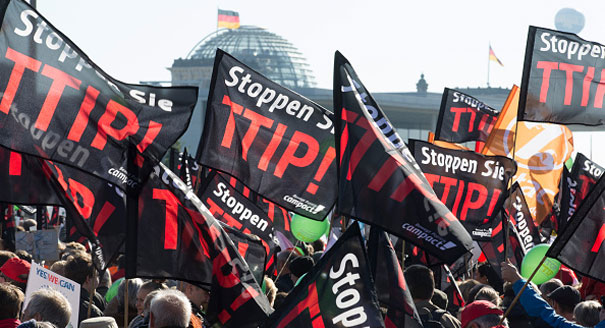On a sunny but cold fall morning on October 10, Germany’s governing Christian Democratic Union had set up a small stand in Berlin’s southwestern district of Zehlendorf to try to recruit new members.
The two party supporters running the stand weren’t making much of an effort to drum up support for Angela Merkel’s conservative bloc, even though the chancellor is coming under criticism for her open-door policy toward the refugees fleeing the war in Syria.
As for TTIP, the Transatlantic Trade and Investment Partnership that U.S. and EU officials are busy negotiating, there was little interest in the issue. “I suppose it would be a good thing for German companies,” one of the young Christian Democrats said. And that was the end of a topic that has the potential to reshape the post–World War II liberal order.
With such an opposition that continues to swell across Europe, EU leaders are going to have a hard time convincing the public of the long-term geostrategic benefits of TTIP.
The partnership is about the United States and Europe setting new comprehensive global rules for a standards-based trading system. With the transatlantic relationship in poor shape and the Europeans reluctant to take responsibility for their own security and defense, a transatlantic trade accord could be the catalyst for halting the widening gap between the two sides of the Atlantic.
Furthermore, in the long term, such a deal could increase Europe’s energy security. The Europeans could have access to U.S. energy (assuming the U.S. Congress permits the export of such resources), a move that would weaken Europe’s dependence on Russian gas.
Above all, if the EU and the United States fail to clinch an accord on TTIP, then the chances are that they will have ceded to China the responsibility for setting trading rules, as Beijing seeks to replace the United States as the world’s biggest and most important economy.
Is that what TTIP opponents really want: a Communist party that is neither accountable for nor transparent about setting the agenda for world trade and all the standards needed for a functioning trading system based on a liberal philosophy. In fact, the role of China hardly figures in these debates.
Instead, one of the many complaints by TTIP opponents is that the negotiations have been shrouded in secrecy. As a result, the European Commission has become more open in explaining the goals of TTIP—an agreement that, if concluded, would consist of 24 chapters grouped into three parts. Those parts are market access, regulatory cooperation, and the rules under which companies operate.
The commission’s efforts, hardly helped by EU leaders, have done little to diminish the anti-Americanism that pervades the anti-TTIP lobbies. And that is the implicit message of the anti-TTIP movement—that the United States will turn Europe into an American vassal. That the United States will contaminate Europe’s culture; that the United States will weaken Europe’s consumer, environmental, and social standards; and that the United States will call the shots when it comes to data protection.
A recent ruling by the European Court of Justice that struck down a transatlantic pact used by thousands of companies to transfer Europeans’ personal information to the United States shows just how sensitive the issue of data protection is in Europe. The court ruled that the pact violated the privacy rights of Europeans by exposing them to allegedly indiscriminate surveillance by the U.S. government. This ruling does not bode well for a successful outcome of the TTIP talks.
Europe and the United States need #TTIP for various reasons.Tweet This
Yet Europe and the United States need TTIP for various reasons.
For Europe, over time TTIP could revive the continent’s economies and halt its decline. It’s all very well for the EU and European leaders to boast about values and soft power. But promoting such values proves increasingly difficult if Europe’s economies remain sluggish and uncompetitive and governments continue to tolerate inflexible labor practices in the face of an ever-aging population.
Furthermore, the long-term benefits of unhindered European access to American markets and of the establishment of common standards cannot be overestimated.
The United States has its own interests in wanting TTIP—as U.S. President Barack Obama confirmed when he campaigned hard for the Trans-Pacific Partnership, or TPP. This deal was reached on October 5 between the United States and eleven Pacific Rim countries but still needs the approval of the U.S. Congress.
Both TTIP and TPP are about the United States building alliances—across the Atlantic and across the Pacific to deal with China. And since the United States cannot do it alone, it needs allies to strengthen its hand in protecting its economic, trading, and, indeed, military dominance. In short, both pacts are seen as a competition between the United States and China for setting the trading rules of the twenty-first century.
EU leaders now have to decide if they want to go all out for #TTIP.Tweet This
EU leaders now have to decide if they want to go all out for TTIP or continue to allow the partnership’s opponents to win the day.
German political leaders are finally getting off the fence. Merkel has spoken out about TTIP not only to her party but also to the country’s trade unions. Sigmar Gabriel, the leader of the Social Democrats and Merkel’s coalition partner, has come out strongly in favor the agreement too—and on the same day as the enormous anti-TTIP demonstration in Berlin. Industry is lobbying, especially the small and medium-sized enterprises, or Mittelstand, that are desperate to have common standards that will lead to big savings.
But for an accord on TTIP to be reached—and before Obama leaves office in January 2017—it’s going to need much more support from European governments to strike a new transatlantic bargain.








.jpg)